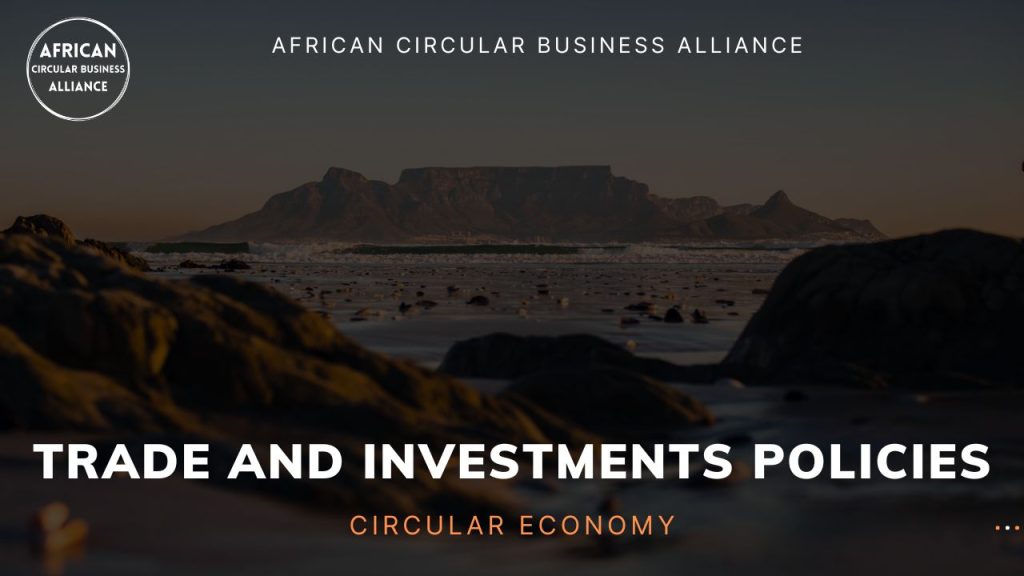
The circular economy is an economic model that emphasizes the reuse and recycling of resources in order to minimize waste and maximize the use of existing resources. This model is gaining increasing attention in Africa as a means of promoting sustainable economic development. Circular economy trade and investment policies can play a critical role in promoting this model in Africa. In this article, we will explore the importance of circular economy trade and investment policies in Africa and the challenges and opportunities that come with their implementation.
Importance of Circular Economy Trade and Investment Policies in Africa
Africa is a continent with vast untapped potential for economic growth and development. However, the current linear economic model, which is based on the extraction of raw materials, production, consumption, and disposal, has led to environmental degradation and resource depletion. The circular economy model presents a viable alternative that can help promote sustainable economic growth in Africa.
Circular economy trade and investment policies can play a critical role in promoting sustainable economic development in Africa. By incentivizing companies to adopt circular economy practices and encouraging investment in circular economy infrastructure, these policies can create new opportunities for economic growth and job creation while also reducing the environmental impact of economic activity.
In addition, circular economy trade and investment policies can promote regional integration and collaboration. By working together to create regional circular economy policies and standards, countries can help ensure that economic activity is sustainable and environmentally responsible across borders. This could include developing regional markets for recycled materials or establishing common standards for product design and packaging that prioritize reuse and recycling.
Challenges to Implementation of Circular Economy Trade and Investment Policies in Africa
Despite the potential benefits of circular economy trade and investment policies, there are several challenges to their implementation in Africa. One of the challenges is the lack of awareness and understanding of the circular economy model. Many African countries are still grappling with basic economic challenges, and the circular economy model may not be a priority for them. Therefore, there is a need for increased awareness and education about the circular economy model in Africa.
Another challenge is the lack of adequate funding for circular economy infrastructure. Investment in recycling facilities, waste-to-energy plants, or other infrastructure that promotes the reuse and recycling of resources requires significant capital. Many African countries may not have the resources to invest in such infrastructure. Therefore, there is a need for increased investment in circular economy infrastructure in Africa.
Finally, there is a need for political will and leadership to drive the implementation of circular economy trade and investment policies in Africa. This includes the development of supportive legal and regulatory frameworks and the allocation of resources to support the transition to a circular economy.
Opportunities for Implementation of Circular Economy Trade and Investment Policies in Africa
Despite the challenges, there are several opportunities for the implementation of circular economy trade and investment policies in Africa. One of the opportunities is the growing demand for sustainable products and services. Consumers are becoming more conscious of the environmental impact of their consumption choices and are demanding more sustainable products and services. Therefore, there is a market opportunity for companies that adopt circular economy practices.
Another opportunity is the potential for job creation. The circular economy model creates new job opportunities in areas such as recycling, repair, and remanufacturing. These jobs are often local and can help create economic opportunities in communities that are traditionally marginalized.
Finally, the circular economy model can help address the environmental challenges facing Africa. The current linear economic model is not sustainable and has led to environmental degradation and resource depletion. The circular economy model can help reduce waste and promote the efficient use of resources, thereby reducing the environmental impact of economic activity.
Conclusion
Circular economy trade and investment policies have the potential to play a critical role in promoting sustainable economic development in Africa. By encouraging the adoption of circular economy practices and investing in circular economy infrastructure, African countries can create new opportunities for economic growth while also reducing their environmental impact.
